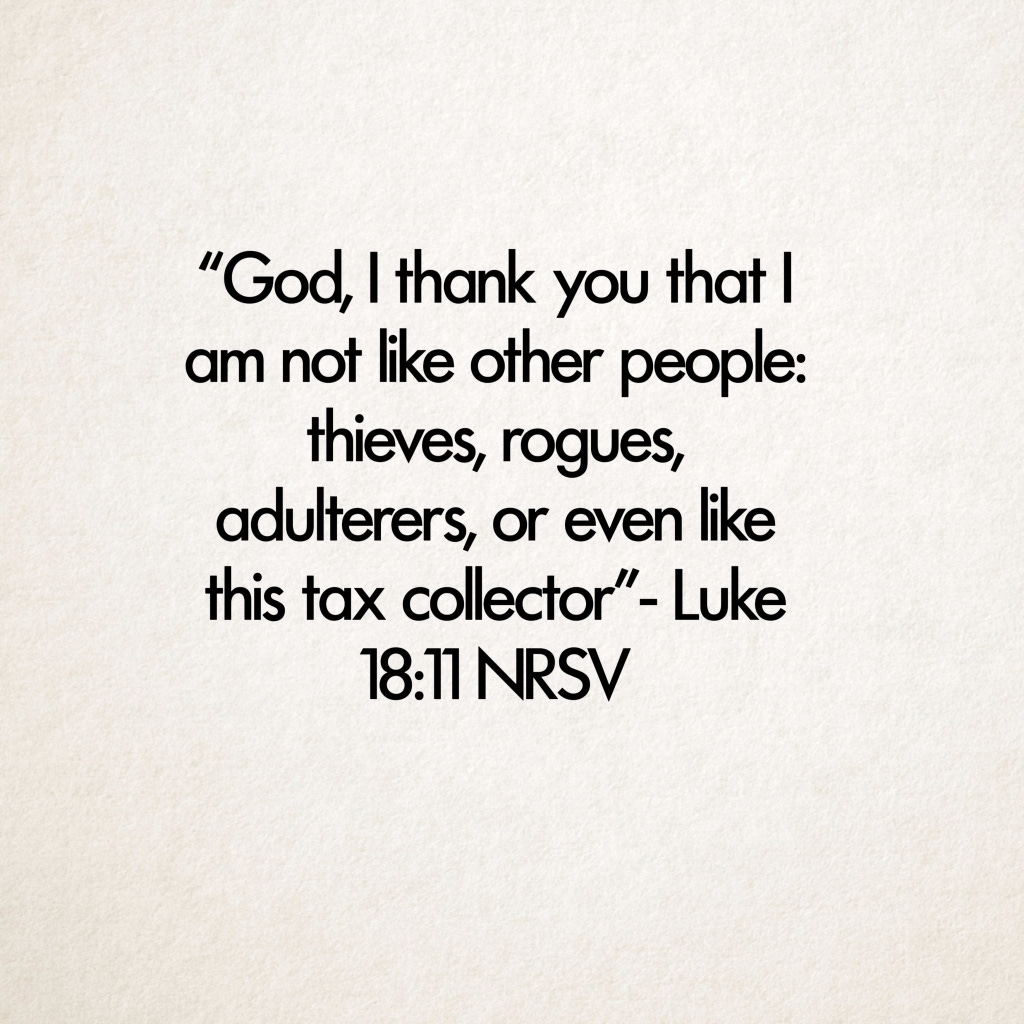Day 19: Not Like Them...
#RethinkChurch is doing a 22-day journey for self-reflection based on John Wesley’s 22 questions. I am composing short blog posts addressing each question. I am using these posts to encourage Christians, especially Progressive and Mainline Christians to reflect deeply on what it means to be Church in a world marred by oppression and violence.
Note: Bri-Anne in her daily instagram reflection and check in, pointed out how the Pharisees have been scapegoated in the gospels and throughout Christianity in ways that are unfair and that verge on anti-semitism and anti-judaism. I maintain the language of Pharisee in the original question, because it is Wesley's language. However, I try not to reference the Pharisee in my actual post for that reason. Instead I focus on the first part, "Do I thank God that I am not as other people?" But I thought it was important to acknowledge how problematic the John Wesley's original phrasing is.
Day 19: Do I thank God that I am not as other people, especially as the Pharisees who despised the publican?
I consider myself a Progressive Christian. There is a lot about Progressive Christianity that I like: it’s advocacy for the radical inclusion of the LGBTQ+ community in larger society and in the Church, its openness and flexibility when it comes to interpreting Scripture, and its social justice advocacy.
However, less appealing has been the tendency to point out the weaknesses of Evangelical Christianity while ignoring its own. Look, I get it. I used to be an Evangelical/Fundamentalist Christian and so I have a lot to say about the harm that Evangelical Christianity can cause, especially when meshed with conservative politics.
I am not against criticizing the excesses of standard, white Evangelical Christianity. I am against certain segments of Progressive Christianity hyper focusing on the weaknesses of Evangelical/Fundamentalist Christianity while ignoring the ways in which Progressive Christianity fails to live up to its ideals. Of course, no institution or individual can ever perfectly put into practice their ideals. I am not asking for perfection. I am, however, asking for accountability.
All of us who consider ourselves to be Progressive Christians need to critically examine our own lives and our own congregations for the many ways we fall short, without making excuses. I will be honest; I have attended many congregations where my bisexuality is embraced but my brownness is not. My queerness is celebrated while my brownness, is at best, tolerated. Of course, the racism is not necessarily explicit. No one tells me that I need to leave. But in some congregations, it is very clear that I am nothing more than a space filler meant to make the congregation feel good about their “lack of racism.” But my lived experiences as a Brown woman is ignored.
It is easy to point out the ways in which Evangelical Christianity tied with Conservative politics have contributed to the oppression and marginalization of vulnerable groups. Much harder is to acknowledge the ways in which we, Progressive Christians and our institutions have done the same.
Many Progressive Christians are part of Mainline denominations, whose commitment to various social justice issues varies. And the Mainline Church in general, is struggling right now. Not only with potential splits over politics and sexuality, but many are in survival mode. The desperation to survive can bring out the best or worst in institutions. It can lead to new and exciting ministries or to infighting and exclusion.
Let’s strive to always do and be better.
Day 1: Illusions of Perfection
Day 2: The Dangers of Embellishment
Day 3: Loose Lips Sink Ships or Silence Kills?
Day 5: The Oppression of Professionalism
Day 6: Mental Illness and Distorted Thinking
Day 8: Making Sense of the Bible
Day 9: Praying to Cosmic Santa Clause
Day 10: The Importance of Talking…and Listening
Day 11: The Necessity of Economic Justice
Day 12: The Sacredness of Rest
Day 13: Obeying the Greatest Commandments
Day 15: For the Brokenhearted…
Day 16: Jealousy, Anger, and Viciousness on Social Media



